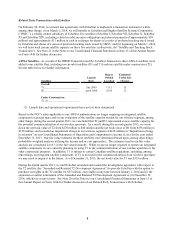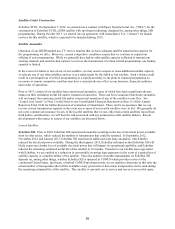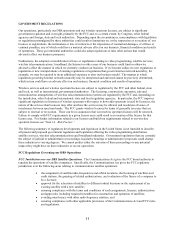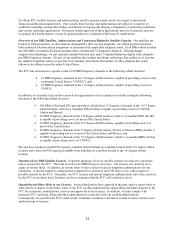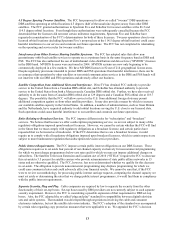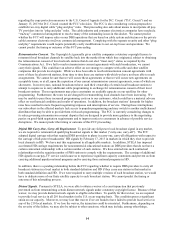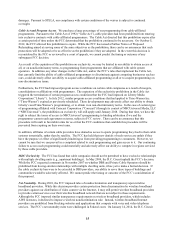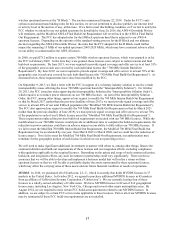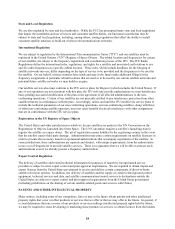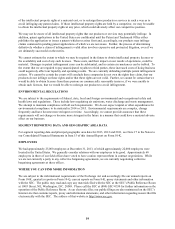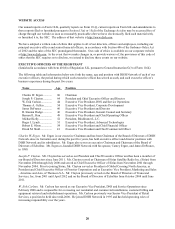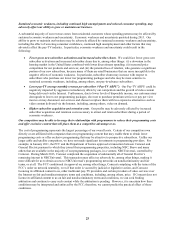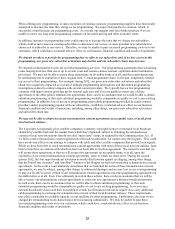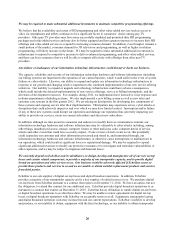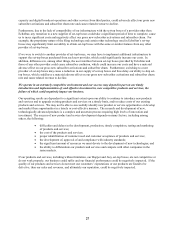Dish Network 2013 Annual Report Download - page 28
Download and view the complete annual report
Please find page 28 of the 2013 Dish Network annual report below. You can navigate through the pages in the report by either clicking on the pages listed below, or by using the keyword search tool below to find specific information within the annual report.18
18
State and Local Regulation
We are also regulated by state and local authorities. While the FCC has preempted many state and local regulations
that impair the installation and use of towers and consumer satellite dishes, our businesses nonetheless may be
subject to state and local regulation, including, among others, zoning regulations that affect the ability to install
consumer satellite antennas or build out wireless telecommunications networks.
International Regulation
We are subject to regulation by the International Telecommunication Union (“ITU”) and our satellites must be
registered in the United Nations (“UN”) Registry of Space Objects. The orbital location and frequencies for certain
of our satellites are subject to the frequency registration and coordination process of the ITU. The ITU Radio
Regulations define the international rules, regulations, and rights for a satellite and associated earth stations to use
specific radio frequencies at a specific orbital location. These rules, which include deadlines for the bringing of
satellite networks into use, differ depending on the type of service to be provided and the frequencies to be used by
the satellite. On our behalf, various countries have made and may in the future make additional filings for the
frequency assignments at particular orbital locations that are used or to be used by our current satellite networks and
potential future satellite networks we may build or acquire.
Our satellite services also must conform to the ITU service plans for Region 2 (which includes the United States). If
any of our operations are not consistent with this plan, the ITU will only provide authorization on a non-interference
basis pending successful modification of the plan or the agreement of all affected administrations to the non-
conforming operations. Certain of our satellites are not presently entitled to any interference protection from other
satellites that are in conformance with the plan. Accordingly, unless and until the ITU modifies its service plans to
include the technical parameters of our non-conforming operations, our non-conforming satellites, along with those
of other non-conforming satellite operators, must not cause harmful electrical interference with other assignments
that are in conformance with the ITU service plans.
Registration in the UN Registry of Space Objects
The United States and other jurisdictions in which we license satellites are parties to the UN Convention on the
Registration of Objects Launched into Outer Space. The UN Convention requires a satellite’s launching state to
register the satellite as a space object. The act of registration carries liability for the registering country in the event
that the satellite causes third party damage. Administrations may place certain requirements on satellite licensees in
order to procure the necessary launch or operational authorizations that accompany registration of the satellite. In
some jurisdictions, these authorizations are separate and distinct, with unique requirements, from the authorization
to use a set of frequencies to provide satellite services. There is no guarantee that we will be able to procure such
authorizations even if we already possess a frequency authorization.
Export Control Regulation
The delivery of satellites and related technical information for purposes of launch by foreign launch service
providers is subject to strict export control and prior approval requirements. We are required to obtain import and
export licenses from the United States government to receive and deliver certain components of direct-to-home
satellite television systems. In addition, the delivery of satellites and the supply of certain related ground control
equipment, technical services and data, and satellite communication/control services to destinations outside the
United States are subject to export control and prior approval requirements from the United States government
(including prohibitions on the sharing of certain satellite-related goods and services with China).
PATENTS AND OTHER INTELLECTUAL PROPERTY
Many entities, including some of our competitors, have or may in the future obtain patents and other intellectual
property rights that cover or affect products or services that we offer or that we may offer in the future. In general, if
a court determines that one or more of our products or services infringe intellectual property rights held by others,
we may be required to cease developing or marketing those products or services, to obtain licenses from the holders



